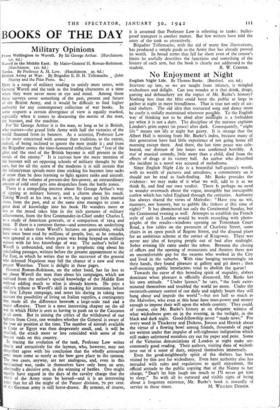No Enjoyment at Night
English Night Life. By Thomas Burke. (Batsford. ios. 6d.)
STAYING up late, so we are taught from infancy, is mingled wickedness and delight. Can you wonder at it that drink, drugs, gaming and debauchery are the topics of Mr. Burke's history? Nothing less than the blitz could force the public at large to gather at night in mere friendliness. That is true not only of air- raid shelters. The old idea that nocturnal song and dance must be costly is stolidly maintained wherever possible. To the English way of thinking not to be abed after midnight is a forbidden joy when it is not a duty. The discipline of the nursery explains London's grim aspect (in peace) after dark. Consequently, " night life " means not life at night but gaiety. It is strange that the Albert Hall is missing from Mr. Burke's index, because many of this generation have had little experience of not going home till morning except there. And there, the last time peace was cele- brated, our distrust of late hours was confirmed horribly. A star of musical comedy, little more than a child, died from the effects of drugs at its victory ball. An author who described the incident in a novel was accused. of melodrama.
Since English Night Life is a bountiful half-guinea's worth, with its wealth of pictures and anecdotes, a commentary on it should not be read as fault-finding. Mr. Burke provides the evidence : we may make of it what we will, add to it as we think fit, and find our own verdict. There is perhaps no need to wonder overmuch about the vague, intangible but inescapable curfew which has ruled England through the centuries. Authority has always shared the views of Malvolio: " Have you no wit,
manners, nor honesty, but to gabble tinkers at this time of night? " It has abominated not only the Continental Sunday, but the Continental evening as well. Attempts to establish the French style of cafe in London would be worth recording with photo- graphs of the results—windows opening on Tottenham Court Road, a few tables on the pavement of Charlotte Street, some chairs in an open porch of Regent Street, and the disused plans for an ambitious scheme at the corner of Kingsway. There was never any idea of keeping people out of bed after midnight. Sober evening life came under the taboo. Between the closing of offices and the opening of restaurants and theatres there was an uncomfortable gap for the swarms who worked in the City and lived in the suburbs. With time hanging tormentingly on their hands, they found pleasure at gallery and pit doors ; then well-meaning public benefactors, tried to abolish the queue!
Towards the curse of this brooding spirit of stupidity, &Ways dominant when pleasure is officially discussed, Mr. Burke has his own attitude. "Under licence," he says, "the fools exter- minated themselves and troubled the world no more. Under the twentieth-century control of our daily and nightly hours they still hang about and impede the world "—but not half so much as the Malvolios, who even at this hour have man-power and money enough to impose their will upon the whole country. They could, of course, cite Mr. Burke's history as an eloquent witness of what wickedness goes on in the evening, in the twilight, in the black and dark night. Good-fellowship never " made news." For every word in Thackeray and Dickens, Jonson and Herrick about the virtue of a flowing bowl among friends, thousands of pages are written under that impulse of self-righteous indignation which still makes unlettered moralists cry out for paper and pens. Some of the Victorian denunciations of London at night make un- commonly good reading. Their authors, visiting dens of wicked- ness out of a sense of duty, enjoyed themselves immensely.
Even the good-neighbourly spirit of the shelters has been visited by this zest for wickedness. Even here authority also has intruded with rules and regulations to quell enjoyment, the official attitude to the public copying that of the Nanny to her charge, " Don't let him laugh too much or I'll never get him to sleep." So with all its outward and visible signs of being about a forgotten existence, Mr. Burke's book is inwardly of


























 Previous page
Previous page